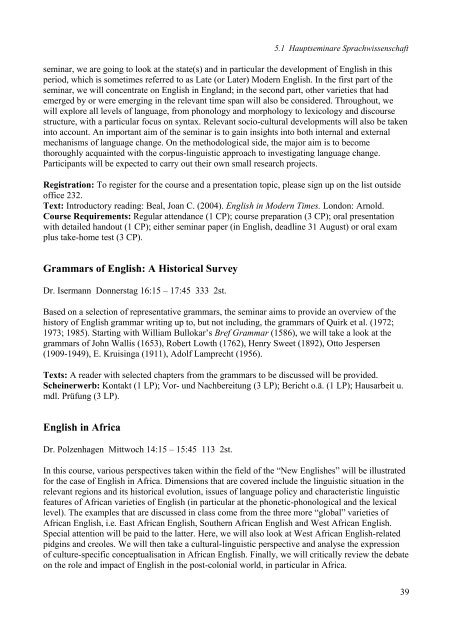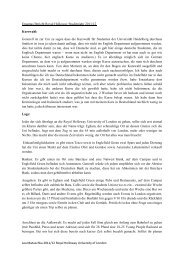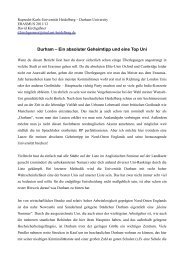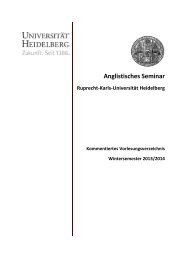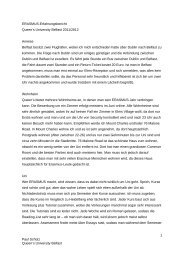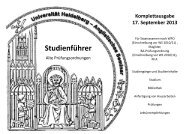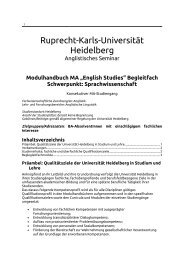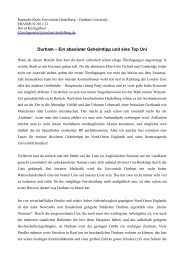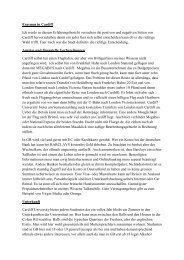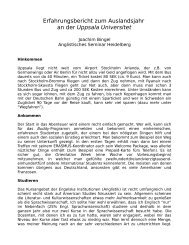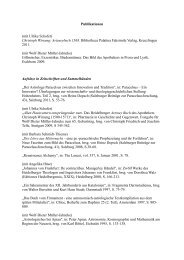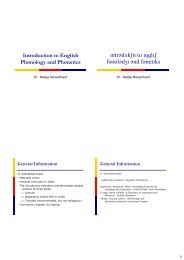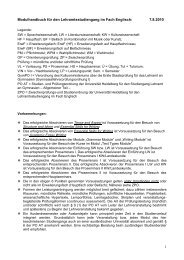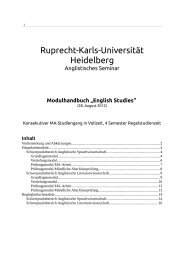Kommentiertes Vorlesungsverzeichnis Anglistik Heidelberg SS 2008
Kommentiertes Vorlesungsverzeichnis Anglistik Heidelberg SS 2008
Kommentiertes Vorlesungsverzeichnis Anglistik Heidelberg SS 2008
Create successful ePaper yourself
Turn your PDF publications into a flip-book with our unique Google optimized e-Paper software.
5.1 Hauptseminare Sprachwissenschaft<br />
seminar, we are going to look at the state(s) and in particular the development of English in this<br />
period, which is sometimes referred to as Late (or Later) Modern English. In the first part of the<br />
seminar, we will concentrate on English in England; in the second part, other varieties that had<br />
emerged by or were emerging in the relevant time span will also be considered. Throughout, we<br />
will explore all levels of language, from phonology and morphology to lexicology and discourse<br />
structure, with a particular focus on syntax. Relevant socio-cultural developments will also be taken<br />
into account. An important aim of the seminar is to gain insights into both internal and external<br />
mechanisms of language change. On the methodological side, the major aim is to become<br />
thoroughly acquainted with the corpus-linguistic approach to investigating language change.<br />
Participants will be expected to carry out their own small research projects.<br />
Registration: To register for the course and a presentation topic, please sign up on the list outside<br />
office 232.<br />
Text: Introductory reading: Beal, Joan C. (2004). English in Modern Times. London: Arnold.<br />
Course Requirements: Regular attendance (1 CP); course preparation (3 CP); oral presentation<br />
with detailed handout (1 CP); either seminar paper (in English, deadline 31 August) or oral exam<br />
plus take-home test (3 CP).<br />
Grammars of English: A Historical Survey<br />
Dr. Isermann Donnerstag 16:15 – 17:45 333 2st.<br />
Based on a selection of representative grammars, the seminar aims to provide an overview of the<br />
history of English grammar writing up to, but not including, the grammars of Quirk et al. (1972;<br />
1973; 1985). Starting with William Bullokar’s Bref Grammar (1586), we will take a look at the<br />
grammars of John Wallis (1653), Robert Lowth (1762), Henry Sweet (1892), Otto Jespersen<br />
(1909-1949), E. Kruisinga (1911), Adolf Lamprecht (1956).<br />
Texts: A reader with selected chapters from the grammars to be discussed will be provided.<br />
Scheinerwerb: Kontakt (1 LP); Vor- und Nachbereitung (3 LP); Bericht o.ä. (1 LP); Hausarbeit u.<br />
mdl. Prüfung (3 LP).<br />
English in Africa<br />
Dr. Polzenhagen Mittwoch 14:15 – 15:45 113 2st.<br />
In this course, various perspectives taken within the field of the “New Englishes” will be illustrated<br />
for the case of English in Africa. Dimensions that are covered include the linguistic situation in the<br />
relevant regions and its historical evolution, issues of language policy and characteristic linguistic<br />
features of African varieties of English (in particular at the phonetic-phonological and the lexical<br />
level). The examples that are discussed in class come from the three more “global” varieties of<br />
African English, i.e. East African English, Southern African English and West African English.<br />
Special attention will be paid to the latter. Here, we will also look at West African English-related<br />
pidgins and creoles. We will then take a cultural-linguistic perspective and analyse the expression<br />
of culture-specific conceptualisation in African English. Finally, we will critically review the debate<br />
on the role and impact of English in the post-colonial world, in particular in Africa.<br />
39


